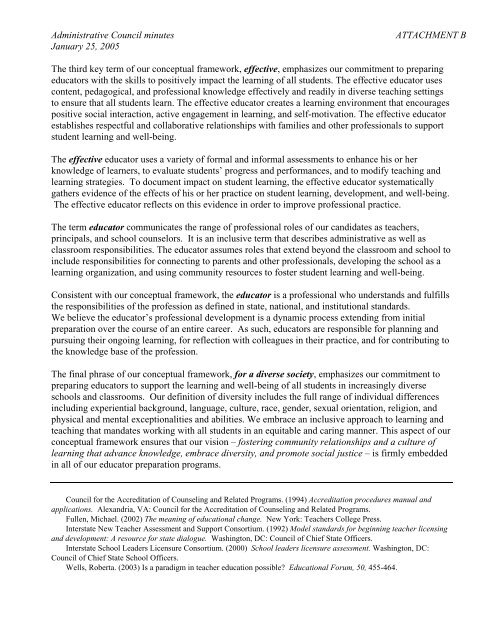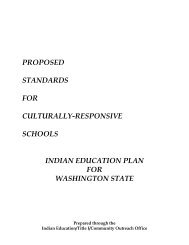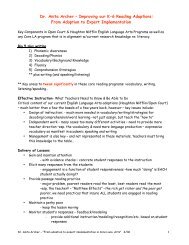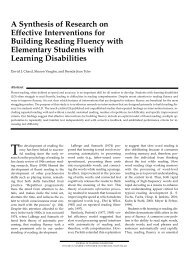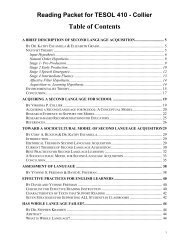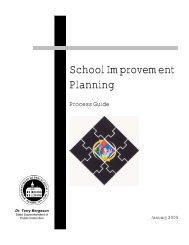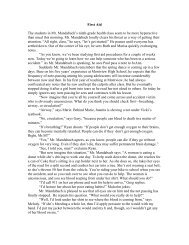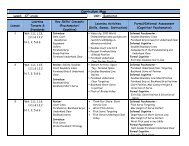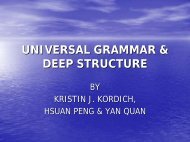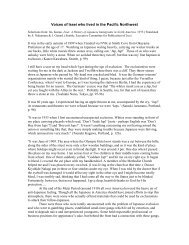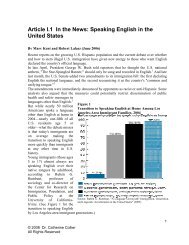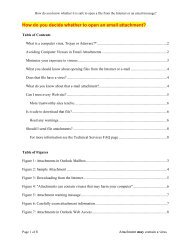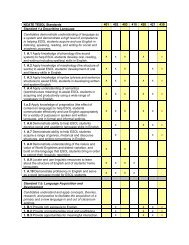January 25 - Woodring College of Education - Western Washington ...
January 25 - Woodring College of Education - Western Washington ...
January 25 - Woodring College of Education - Western Washington ...
Create successful ePaper yourself
Turn your PDF publications into a flip-book with our unique Google optimized e-Paper software.
Administrative Council minutes<strong>January</strong> <strong>25</strong>, 2005ATTACHMENT BThe third key term <strong>of</strong> our conceptual framework, effective, emphasizes our commitment to preparingeducators with the skills to positively impact the learning <strong>of</strong> all students. The effective educator usescontent, pedagogical, and pr<strong>of</strong>essional knowledge effectively and readily in diverse teaching settingsto ensure that all students learn. The effective educator creates a learning environment that encouragespositive social interaction, active engagement in learning, and self-motivation. The effective educatorestablishes respectful and collaborative relationships with families and other pr<strong>of</strong>essionals to supportstudent learning and well-being.The effective educator uses a variety <strong>of</strong> formal and informal assessments to enhance his or herknowledge <strong>of</strong> learners, to evaluate students’ progress and performances, and to modify teaching andlearning strategies. To document impact on student learning, the effective educator systematicallygathers evidence <strong>of</strong> the effects <strong>of</strong> his or her practice on student learning, development, and well-being.The effective educator reflects on this evidence in order to improve pr<strong>of</strong>essional practice.The term educator communicates the range <strong>of</strong> pr<strong>of</strong>essional roles <strong>of</strong> our candidates as teachers,principals, and school counselors. It is an inclusive term that describes administrative as well asclassroom responsibilities. The educator assumes roles that extend beyond the classroom and school toinclude responsibilities for connecting to parents and other pr<strong>of</strong>essionals, developing the school as alearning organization, and using community resources to foster student learning and well-being.Consistent with our conceptual framework, the educator is a pr<strong>of</strong>essional who understands and fulfillsthe responsibilities <strong>of</strong> the pr<strong>of</strong>ession as defined in state, national, and institutional standards.We believe the educator’s pr<strong>of</strong>essional development is a dynamic process extending from initialpreparation over the course <strong>of</strong> an entire career. As such, educators are responsible for planning andpursuing their ongoing learning, for reflection with colleagues in their practice, and for contributing tothe knowledge base <strong>of</strong> the pr<strong>of</strong>ession.The final phrase <strong>of</strong> our conceptual framework, for a diverse society, emphasizes our commitment topreparing educators to support the learning and well-being <strong>of</strong> all students in increasingly diverseschools and classrooms. Our definition <strong>of</strong> diversity includes the full range <strong>of</strong> individual differencesincluding experiential background, language, culture, race, gender, sexual orientation, religion, andphysical and mental exceptionalities and abilities. We embrace an inclusive approach to learning andteaching that mandates working with all students in an equitable and caring manner. This aspect <strong>of</strong> ourconceptual framework ensures that our vision – fostering community relationships and a culture <strong>of</strong>learning that advance knowledge, embrace diversity, and promote social justice – is firmly embeddedin all <strong>of</strong> our educator preparation programs.Council for the Accreditation <strong>of</strong> Counseling and Related Programs. (1994) Accreditation procedures manual andapplications. Alexandria, VA: Council for the Accreditation <strong>of</strong> Counseling and Related Programs.Fullen, Michael. (2002) The meaning <strong>of</strong> educational change. New York: Teachers <strong>College</strong> Press.Interstate New Teacher Assessment and Support Consortium. (1992) Model standards for beginning teacher licensingand development: A resource for state dialogue. <strong>Washington</strong>, DC: Council <strong>of</strong> Chief State Officers.Interstate School Leaders Licensure Consortium. (2000) School leaders licensure assessment. <strong>Washington</strong>, DC:Council <strong>of</strong> Chief State School Officers.Wells, Roberta. (2003) Is a paradigm in teacher education possible? <strong>Education</strong>al Forum, 50, 455-464.


